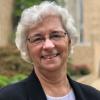Almost a year ago, three U.S. Dominican Sisters journeyed to Iraq to visit the Iraqi Dominican community and the Iraqi people displaced by war and terrorism. Here are some of their thoughts before they set out.
It’s the second day of 2015, which means that after having stuffed our faces for a few weeks, everybody is talking about getting thin. It happens each January without fail. Do we still believe that smaller jeans will somehow lead to a fuller life? How urgently our souls need a different resolution! It’s time to imagine a new kind of “getting thin.”
“Stand up and go; your faith has made you well.”
Being pro-life means being against all unnecessary deaths, including those imposed as punishment by the United States judicial system. For Mercy Sr. Mary Healy and St. Joseph Sr. Helen Prejean, advocating for the elimination of the death penalty, even as its use appears on the wane, is a mission they take seriously and personally.
GSR Today - Oh sure, the mainstream media covered the obvious stories of 2014 concerning women religious – the Nuns on the Bus tour, the Vatican’s report on the apostolic visitation, that reality TV show called “The Sisterhood.” But those aren’t the stories that will stay with me as we turn the corner to 2015. Here are 10 women, or groups of women, who inspire New Year’s resolutions for all of us.
The English Tutoring Project, an initiative of the St. Louis Area Women Religious Collaborative Ministries, helps immigrant and refugee students in Catholic schools acquire English-language skills, in a suburb north of St. Louis, Missouri. Sr. Joyce Schramm, a Sister of Most Precious Blood of O'Fallon, tutors 18 students at Holy Trinity in kindergarten, first and third grades. In all, 106 students are served, representing 11 countries of origin.
Sr. Carol Breslin is a Medical Missionary of Mary, whose members pioneered medical services to girls and women affected by fistula. For many years, working with a number of partners, MMMs have brought relief to thousands of women affected by fistulae in East and West Africa. Members of the order work in 14 countries worldwide and have U.S. houses in Boston, New York and Chicago.
Marcelline Koch is a Dominican Sister of Springfield, Illinois, and directs the Office of Justice for the Dominican Sisters of Springfield and is the North American co-promoter for justice for the Dominican family in North America.
Durstyne (Dusty) Farnan is an Adrian Dominican sister from Michigan. After teaching elementary and junior high, she lived in Ghana, West Africa and Kenya with indigenous religious sisters in their initial formation programs. Later, she ministered in the inner city of Chicago and in psychiatric units as a clinical social worker; she has served her congregation as the director of justice and later vocation director. She currently serves as the U.N. representative for the Dominican Leadership Conference.
...
Arlene Flaherty is a Dominican Sister of Blauvelt, New York, who currently serves on the community's Iraq Coordinating Committee and is Director of the Office of Justice and Peace and Integrity of creation for the Atlantic Midwest Province of the School Sisters of Notre Dame. In 1999 she documented the damaging impact of the policy of sanctions and embargo on Iraqi children and presented those findings to the United Nations Human Rights Commission in Geneva, Switzerland. She has traveled in Syria and Lebanon, documenting the reality of Iraqi refugees who have been displaced by war.





